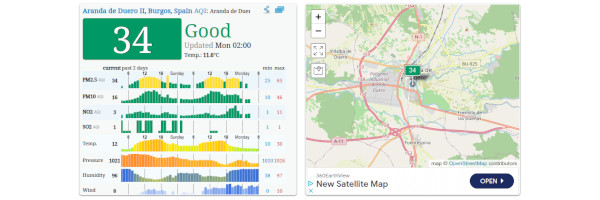Aranda de Duero Real Time Data Platform
| News | |
| Image | 
|
|---|---|
| Published | 2025-05-29 |
| Point(s) of Contact | Radio Aranda |
| Organization(s) | Cadena SER |
| Where | Aranda de Duero Spain |
| Display | Yes |
Aranda de Duero has joined the Red Española de Ciudades Inteligentes (Spanish Network of Smart Cities) to promote sustainable and efficient urban development. The city plans to invest €300,000 in 2025 to develop a digital platform for real-time data on air quality, mobility, energy consumption, and municipal services.
Aranda de Duero, a municipality in Spain's Burgos province, is advancing its smart city initiatives by developing a real-time air quality monitoring platform. In May 2025, the city council unanimously approved joining the Red Española de Ciudades Inteligentes (RECI), a network dedicated to fostering sustainable and efficient urban environments through digital innovation. This membership aligns with Aranda de Duero's broader smart city project, which has allocated €300000$ 340,909.091 <br />£ 252,272.727 <br />CA$ 432,954.545 <br />CNY 2,157,954.545 <br />KRW 417,767.045 <br /> in the 2025 municipal budget to create a digital platform for collecting and analyzing key urban data, including air quality, traffic patterns, energy consumption, and municipal services .
The forthcoming platform aims to provide real-time insights into the city's air quality by integrating data from existing monitoring stations, such as those managed by the Junta de Castilla y León. Currently, the air quality in Aranda de Duero is classified as "Good," with PM2.5 levels around 9 µg/m³, indicating low pollution levels . By consolidating this data into an interactive Geographic Information System (GIS), the city plans to offer a comprehensive view of environmental conditions, aiding in informed decision-making and enhancing public awareness. IQAir
Beyond air quality, the platform is designed to monitor various aspects of urban life, including water consumption, waste collection, and traffic flow. This holistic approach enables city officials to identify patterns, anticipate issues, and implement targeted interventions. For instance, understanding traffic-related pollution hotspots can inform infrastructure improvements or traffic management strategies. Moreover, the GIS component will map critical infrastructure such as lighting, water supply, sanitation, and telecommunications, facilitating efficient maintenance and planning .
Aranda de Duero's commitment to integrating real-time environmental data into its urban management reflects a proactive stance toward sustainability and public health. By leveraging technology to monitor and address air quality and other urban challenges, the city positions itself as a forward-thinking member of the RECI network. This initiative not only enhances the quality of life for residents but also serves as a model for other municipalities aiming to harness digital tools for sustainable urban development.
By integrating into the national smart cities network, Aranda de Duero aims to leverage shared experiences and technologies to enhance urban living and sustainability.